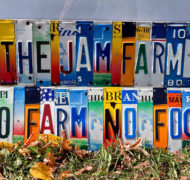Jubilee: How Can I Choose a Job That Matters?
Blog / Produced by The High Calling
We Christians have always been a future-focused people with our eyes set on a coming age when all things will be made new. This vision, which permeates the New Testament, raises questions about the value of our work in the present. How do we find meaning in our labor today when it is the world of tomorrow we desire? Does work in a fallen creation ultimately matter, or is a sense of calling limited to those engaged in heavenly-minded ministry?
Too many Christians conclude that their earthly vocations are ultimately meaningless. They have accepted the pervasive sacred/secular divide that plagues much of the church. Rather than pitting the world of tomorrow against the world we inhabit today—rather than constructing an unbiblical dichotomy of sacred and secular—there is another way of understanding the role our work occupies in a stubbornly imperfect world.
A few weeks ago I was in Cape Town, South Africa—one of the most beautiful places on earth. Rising from the waters of the South Atlantic, the city’s layers build upon each other—colonial structures along the coast, then glass and steel skyscrapers, then rolling green vineyards, and finally the breathtaking wall of Table Mountain that embraces the city like an amethyst armchair.
The best views of the city are from the prison on Robben Island, where Nelson Mandela spent most of his 27-year sentence for defying the apartheid regime of South Africa. From the island, Mandela could see the remarkable beauty of his home, but he could not reach it. Seven kilometers of hostile waters barred the way. To cope with the gap between his vision and his reality, Mandela did something very ordinary—he planted a garden. He said the garden was “a small taste of freedom.”
For me, Mandela’s garden represents our work in a world still imprisoned by sin, injustice, and death. By God’s grace, we can imagine the order, beauty, and abundance of the world that is to come, but we cannot yet reach it. For now, we work to cultivate a small piece of this world until it reflects what we know the world ought to be. When we do this work with God, it brings hope—a small taste of freedom—to a world that desperately needs it.
My friend Walter represents this kind of kingdom cultivation. As a real-estate developer, he is part of God’s restoration of the earth. He is equally interested in economic opportunity and human flourishing for depressed neighborhoods in his city. When he found an ugly, dilapidated property in an under-resourced area of Phoenix, he saw more than a business investment. By restoring the historic buildings on the site, Walter brought order to a neighborhood struggling under chaos. He also wasn’t merely interested in building a useful space, but a beautiful one, with plants and color and architectural interest. Finally, by welcoming new small businesses onto the property, he cultivated abundance—creating jobs where none existed. Walter does not just make smart business decisions, he makes common-good decisions that bring hope to the whole community. Through his work, he provides a glimpse of the world as it should be and as it will be.
This kind of kingdom cultivation isn’t limited to entrepreneurs or those in positions of great influence. I’ve encountered medical workers, teachers, city planners, artists, community organizers, pastors, and homemakers who deliberately cultivate the order, beauty, and abundance of God’s kingdom through their work. They not only find great meaning in their work, but also address the legitimate needs of a world still longing to be set free. They create jobs, educate children, grow food, and administer justice. They become the vessels through which God’s will is done on earth as it is in heaven.
We must not be naive. Our work alone will never usher in the fullness of God’s kingdom, just as Mandela knew his garden could never transform Robben Island into the full beauty of Cape Town. There remains an impassable gap between the world we occupy and the one that is to be revealed. Still, the distance between these two worlds will be bridged. Christ will appear, and the power of his resurrection will be unleashed, as Paul says in Romans 8. Creation itself will be set free from its captivity. On that day, all the world will flourish with the order, beauty, and abundance of God.
Until that day, we will continue to plant our seeds, cultivate our gardens, and find hope through the good work to which our Lord has called each of us.
______________________________
Jubilee: Everything Matters
For the past seven years, The High Calling has supported the Jubilee Conference, an annual gathering of thousands of college students learning how to worship God with their whole lives. Whether a person is interested in engineering and science or art and music, law and politics or medicine and mission, justice and families or college life and the years to come, Jubilee has someone speaking about what it means to be involved in those places faithfully. This week, The High Calling offers a special collection of articles, videos, and reflections to serve the students and campus ministers who attended Jubilee. Join the Jubilee and learn how to worship God with your whole life.
Featured image by Bill Vriesema. Used with Permission. Source via Flickr. How Can I Choose a Job That Matters graphic from the Jubilee 2015 conference booklet sponsored by The High Calling.






